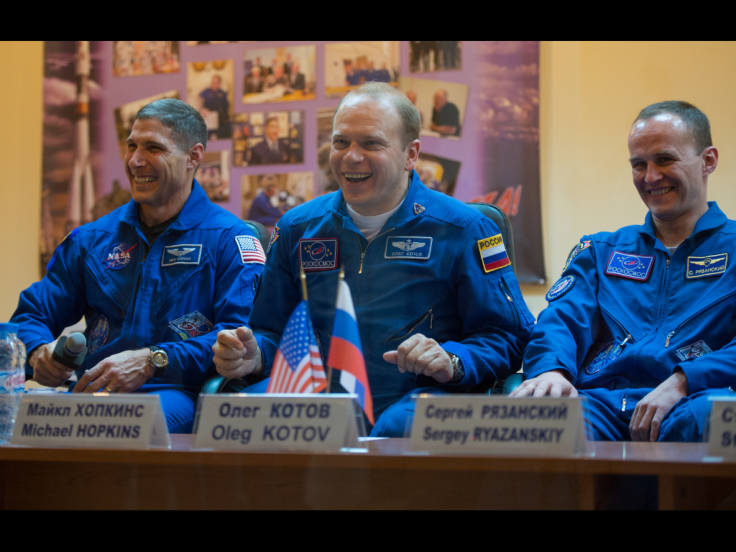New Expedition 37 Crew Members Arrive At The International Space Station

After a six-hour flight abroad a Russian Soyuz spacecraft, three new Expedition 37 crew members reached the International Space Station, or ISS, on Wednesday, a NASA statement said.
According to the space agency, Soyuz commander Oleg Kotov and flight engineers Mike Hopkins and Sergey Ryazanskiy docked their spacecraft to the orbiting laboratory's Poisk mini-research module at 10:45 p.m. EDT. The new crew members had lifted off from the Baikonur Cosmodrome in Kazakhstan at 4:58 p.m. EDT Wednesday.
The crew were scheduled to open the hatches between the Soyuz spacecraft and the space station at about 12:25 a.m. on Thursday. After the hatches open, the new arrivals would participate in a welcome ceremony with Expedition 37 commander Fyodor Yurchikhin of the Russian Federal Space Agency and flight engineers Karen Nyberg of NASA and Luca Parmitano of the European Space Agency, who have been aboard the space station since May 28.
Kotov, Hopkins and Ryazanskiy will remain aboard the ISS for five-and-a-half months until mid-March 2014, after which they will return to Earth on the same Soyuz spacecraft they arrived in, and land in Kazakhstan. Yurchikhin, Nyberg and Parmitano who have seen the arrival of two international resupply ships and one commercial cargo craft will return to Earth on Nov. 11.
Expedition 37 will perform several critical scientific experiments, adding to the more than 1,600 experiments that have taken place so far aboard the space station. According to NASA, the new experiments will focus on human health and human physiology and examine the effects of long-term exposure to microgravity on the immune system. The experiments will also provide metabolic profiles of the astronauts while collecting data to better understand how the human body changes shape in space.
In addition, the crew also will conduct 11 investigations under the Student Spaceflight Experiments Program, which covers areas such as antibacterial resistance, hydroponics, cellular division, microgravity oxidation, seed germination, photosynthesis and the food-making process in microgravity.
During their stay at the space station, Kotov and Ryazanskiy will conduct three spacewalks, the first of which will include taking an unlighted Olympic torch to promote the Sochi Olympic Games in Russia, which is scheduled to begin in February 2014. The torch will be delivered by the next crew arriving at the station on Nov. 6.
“We'd like to showcase our Olympic torch in space. We will try to do it in a beautiful manner. Millions of people will see it live on TV and they will see the station and see how we work,” Reuters quoted Kotov as saying.
© Copyright IBTimes 2024. All rights reserved.












